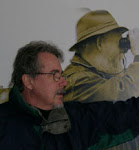What is a liberal arts-based education?
A brief manifesto from the introduction to Dr. Freed's
PHLU 304: Multicultural Ethics class at Brandman University
"Nearly
all contemporary human problems are more
failures of 1) communication, 2) cultural memory, 3)
introspection, 4) observation, 5) analysis, 6) interpretation,
7) common sense, 8) integrity, 9) courage to act, 10) civility, 11)
compassion or 12) imagination than they are insufficiencies
of material means to solve them. Developing these skills
is the prime directive of engaging with the liberal arts."
The teaching methodology for this course is chiefly “inductive” – posing the significant questions for the start of a set of “threaded discussions,” producing a wide-range of relevant [and hopefully intrinsically interesting] primary materials aided by student commentary through the “discussions” as data to be drawn upon, and challenging students to arrive at their own supportable syntheses and answers through the many short writing assignments and required rebuttals.
Brandman University believes strongly in “discovery learning,” which means that students only truly learn what they discover themselves. “Learn by doing” is squarely in the John Dewey, Jean Piaget and Jerome Bruner traditions. Learn natural or social science by doing experiments and research. Learn art by painting or making a film. Learn writing by writing a poem or short story. Learn ethics by thinking and acting ethically. And all students can access this type of learning whether they are in pre-school, college or graduate school.
The objective of this course is to confront us all with a wide range of real issues that replicate how philosophical knowledge about multicultural ethics is constructed and communicated. The ability to absorb, critique and construct new knowledge is our indicator of a truly educated person. Brandman believes that most of these people have had liberal arts based educations – the kind that you get at Brandman.


